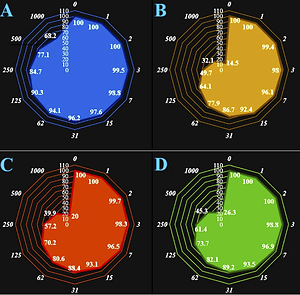Current issue
Archive
Manuscripts accepted
About the Journal
Editorial office
Editorial board
Section Editors
Abstracting and indexing
Subscription
Contact
Ethical standards and procedures
Most read articles
Instructions for authors
Article Processing Charge (APC)
Regulations of paying article processing charge (APC)
ONCOLOGY / BASIC RESEARCH
Anti-human ovarian cancer, cytotoxicity, and antioxidant effects of Nigella sativa green-formulated Au nanoparticles: describing a new chemotherapeutic supplement
1
Department of Gynecology, The First People’s Hospital of Wenling, Wenling, Zhejiang, China
2
Department of Gynecology, Affiliated Hospital of Shandong University of Traditional Chinese Medicine, Jinan, Shandong, China
3
Department of Botany and Microbiology, College of Science, King Saud University, Riyadh, Saudi Arabia
4
Department of Pediatrics, College of Medicine and King Khalid University Hospital, King Saud University, Medical City, Riyadh, Saudi Arabia
5
Department of Cellular and Molecular Biology, University of Texas Health Science Center at Tyler, Tyler, Texas, United States
6
Department of Gynecology, Northwest Women and Children’s Hospital, Xi ‘an, Shaanxi, China
Submission date: 2021-05-30
Final revision date: 2021-07-22
Acceptance date: 2021-07-24
Online publication date: 2021-11-24
Corresponding author
Ling Zhang
Gynecology, Northwest Women and Children's Hospital, Xi 'an, Shaanxi, 710061, China., China
Gynecology, Northwest Women and Children's Hospital, Xi 'an, Shaanxi, 710061, China., China
KEYWORDS
TOPICS
ABSTRACT
Introduction:
This research showed that gold nanoparticles (GNPs) formulated with Nigella sativa aqueous extract have potent antioxidant and anti-human ovarian cancer activities in in vitro conditions.
Material and methods:
To determine the properties of the GNPs that were produced from the reaction between gold chloride solution and aqueous Nigella sativa extract, we used UV-visible spectroscopy (UV-Vis), field emission scanning electron microscopy (FE‐SEM), Fourier transform infrared spectroscopy (FT‐IR), and transmission electron microscopy (TEM). For evaluating anti-ovarian cancer and cytotoxicity effects of GNPs, Au chloride, and Nigella sativa aqueous extract, we used the MTT assay.
Results:
The results of this test showed that GNPs have no cytotoxicity on a normal cell line (HUVEC) and have potent anti-ovarian cancer features dose-dependently against PA-1, SK-OV-3, and SW-626 cell lines. The IC50 values of GNPs were 249, 361, and 433 µg/ml against PA-1, SW-626, and SK-OV-3 cell lines, respectively. For evaluating the antioxidant features of GNPs, Au chloride, and Nigella sativa aqueous extract, we used the DPPH test; in this test butylated hydroxytoluene was a positive control; the results of this test showed that the GNPs have an effective antioxidant action. In the antioxidant test, the IC50 values of GNPs and BHT were 144 and 201 µg/ml, respectively.
Conclusions:
Probably, potent anti-human ovarian cancer activities of GNPs formulated with Nigella sativa aqueous seed extract are due to antioxidant properties. After evaluating the effectiveness of this formulation in clinical trial research, it can be a good alternative to chemotherapy drugs.
This research showed that gold nanoparticles (GNPs) formulated with Nigella sativa aqueous extract have potent antioxidant and anti-human ovarian cancer activities in in vitro conditions.
Material and methods:
To determine the properties of the GNPs that were produced from the reaction between gold chloride solution and aqueous Nigella sativa extract, we used UV-visible spectroscopy (UV-Vis), field emission scanning electron microscopy (FE‐SEM), Fourier transform infrared spectroscopy (FT‐IR), and transmission electron microscopy (TEM). For evaluating anti-ovarian cancer and cytotoxicity effects of GNPs, Au chloride, and Nigella sativa aqueous extract, we used the MTT assay.
Results:
The results of this test showed that GNPs have no cytotoxicity on a normal cell line (HUVEC) and have potent anti-ovarian cancer features dose-dependently against PA-1, SK-OV-3, and SW-626 cell lines. The IC50 values of GNPs were 249, 361, and 433 µg/ml against PA-1, SW-626, and SK-OV-3 cell lines, respectively. For evaluating the antioxidant features of GNPs, Au chloride, and Nigella sativa aqueous extract, we used the DPPH test; in this test butylated hydroxytoluene was a positive control; the results of this test showed that the GNPs have an effective antioxidant action. In the antioxidant test, the IC50 values of GNPs and BHT were 144 and 201 µg/ml, respectively.
Conclusions:
Probably, potent anti-human ovarian cancer activities of GNPs formulated with Nigella sativa aqueous seed extract are due to antioxidant properties. After evaluating the effectiveness of this formulation in clinical trial research, it can be a good alternative to chemotherapy drugs.
Share
RELATED ARTICLE
We process personal data collected when visiting the website. The function of obtaining information about users and their behavior is carried out by voluntarily entered information in forms and saving cookies in end devices. Data, including cookies, are used to provide services, improve the user experience and to analyze the traffic in accordance with the Privacy policy. Data are also collected and processed by Google Analytics tool (more).
You can change cookies settings in your browser. Restricted use of cookies in the browser configuration may affect some functionalities of the website.
You can change cookies settings in your browser. Restricted use of cookies in the browser configuration may affect some functionalities of the website.



